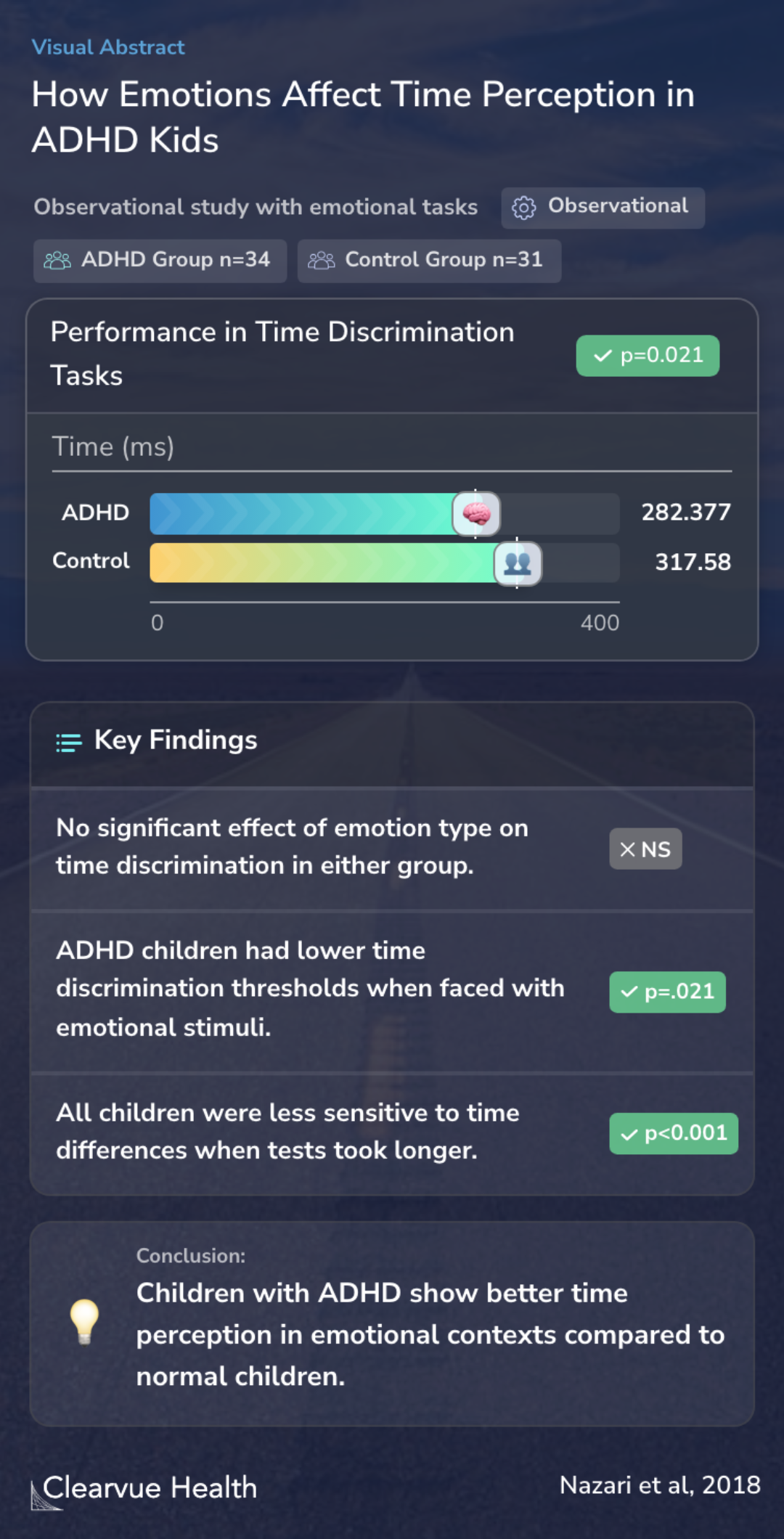Emotional stimuli facilitate time perception in children with attention-deficit/hyperactivity disorder
How Emotions Affect Time Perception in ADHD Kids
Mohammad A Nazari, Mohammad M Mirloo, Mazaher Rezaei, Mojtaba Soltanlou

Objectives
The study's main aim was to explore how emotional stimuli affect time perception in children with ADHD compared to those without. Specifically, it investigated whether exposure to neutral, positive, or negative emotional images would impact their ability to discern time in a dual-task context.
The aim of this study was to compare the effect of different emotional stimuli (neutral, positive, and negative) on time perception in children with attention-deficit/hyperactivity disorder (ADHD) and normal children in dual-task form.
Methods
The research methodology involved selecting 599 primary school students at random. Teachers provided assessments using the Conner's Teacher Rating Scale (CTRS). Of these, 100 children who scored above the CTRS cut-off point underwent further evaluation with the Child Symptom Inventory-4 (CSI-4). The final group consisted of 34 children diagnosed with ADHD and 31 control children. They participated in an emotional time discrimination task, comparing images with varied emotional content in time blocks of 1000 and 2000 milliseconds, to assess their perception of time under different emotional states.
Five hundred and ninety-nine students from primary schools were randomly selected. The Conner's Teacher Rating Scale (CTRS) questionnaire was completed by teachers. A total of 100 children with a score above the cut-off point for the CTRS were further assessed using the Child Symptom Inv...
Results
The results of the study indicated that children with ADHD performed significantly better in discriminating time when exposed to emotional stimuli, compared to the control group. This finding is noteworthy as it contrasts with previous studies, which generally show that children with ADHD have a poorer sense of short time periods. The average discrimination threshold for children with ADHD was about 35 milliseconds shorter than that of the control group.
All children, including those with and without ADHD, were less able to distinguish between shorter time periods in the longer tests. However, the study did not find any significant effect of the type of emotional stimuli on time perception. It's important to note that the size of this study was relatively small, and it lacked the rigor of some larger studies, which calls for cautious interpretation of these results.
Children with ADHD had significantly better performance in the emotional time discrimination task across all conditions when compared with controls: On average, discrimination thresholds were approximately 35 ms shorter for the children with ADHD.
Conclusions
The study suggests that children with ADHD may have a different sense of time when presented with emotionally engaging stimuli, showing better time perception in these contexts compared to normal children. This is an intriguing finding, especially considering the inconsistency with previous research, which consistently showed that ADHD impairs time perception. Further research is needed to determine whether these findings are an accurate representation of the effect of emotional stimuli on time perception in children with ADHD or if they are influenced by the study's smaller scale and methodology.
Our results indicate that children with ADHD have higher sensitivity to time relative to controls in a situation in which they must distribute resources between temporal and emotional processing. On the basis of the interference effect and the working memory capacity hypothesis, this div...
Key Takeaways
Context
The study's conclusions offer a unique viewpoint compared to existing literature. For example, Zheng et al., 2022, found that children with ADHD generally have less accurate time perception, often overestimating time.
Furthermore, the 2003 study by McInerney RJ et al. suggested that motivation can influence time perception in children with ADHD. While they performed better in motivated tasks, they still lagged behind controls, adding complexity to our understanding of ADHD's impact on time perception.